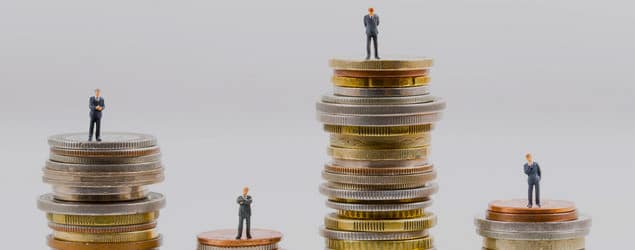Do the Inequality Alarmists Advocate Full Equality?

In Equal Is Unfair: America’s Misguided Fight Against Income Inequality, Yaron Brook and I argue that the campaign to fight economic inequality is unjust. One response I’ve heard from people who have only seen the title of the book (and one critical reviewer) is that we’re attacking a straw man. No one advocates full economic equality, they say.
That’s actually not true. The Khmer Rouge certainly advocated full equality, as have various philosophers. But it is true that today’s mainstream critics of economic inequality don’t propose that the government eliminate all economic inequality — they say that it should merely act to reduce inequality (although they stubbornly refuse to tell us how much inequality they would tolerate). And, in fact, nothing in our book says otherwise.
Why, then, title the book Equal Is Unfair, which might suggest that some people are championing full equality? Because what’s at issue here is not, fundamentally, the particular proposals today’s inequality critics happen to endorse. It’s whether economic equality is a moral ideal.
And for many critics, equality is a moral ideal. A fully just world would be one in which everyone had the same amount of wealth and income. Why? Because, in their view, no one deserves a greater share of “society’s wealth.” Those who are more intelligent, more ambitious, more productive — they are beneficiaries of luck, whether it be good genes, a good upbringing, or rich parents. They cannot claim by right what they’ve created since “they didn’t build that” — they cashed in on forces outside of their control.
This, in effect, is the philosopher John Rawls’s view, and it is echoed by everyone from President Obama to economist Thomas Piketty. For many inequality critics, there would be nothing morally objectionable about the government confiscating and redistributing wealth so that we were all perfectly equal.
Their only objection to such a program is that it is impractical: we would all be worse off in such a scenario. Communists had imagined that people could be motivated to produce for the sake of “society” rather than their own well-being. But modern inequality critics generally recognize that this is a fantasy. Leveling everyone down to the lowest common denominator, they concede, would destroy the incentive to produce and innovate.
Their stated goal, then, is to reduce economic inequality as much as possible, so long as we don’t hurt economic growth and, above all, so long as we don’t make the worst off worse off.
Thus you get economists like Piketty and Paul Krugman telling us that we should raise top marginal tax rates as high as 70 or even 80 percent since we can allegedly do so without hampering the economy. The debate is seen solely as an empirical matter — seizing the vast majority of what a person earns is regarded as morally unproblematic.
Yet that is what we’re challenging in Equal Is Unfair. We do not view economic equality as an ideal — we regard it as immoral. People do earn very different amounts of wealth when they are left free, and they have a moral right to the wealth they earn. It is wrong for the government to use its coercive might to “reduce inequality,” not because it will create perverse incentives (although it will). It is wrong because it deprives people of the rewards that in justice belong to them.
Achievement is unequal, and so equal is unfair.
For more news on ARI’s fight for a rational culture, subscribe to Impact Weekly.



